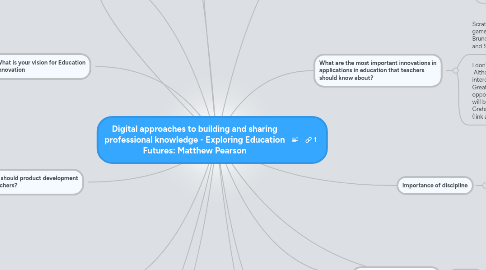Digital approaches to building and sharing professional knowledge - Exploring Education Futures: Matthew Pearson
by John Cuthell

1. How much should product development involve teachers?
1.1. the ideal digital environment would be one built to meet the needs of teachers
2. Describe the most effective developments where teachers have been involved
2.1. From the 'early days' things like the Kings College Computers in the Curriculum materials, Also: MEP - they produced some fabulous software. It's successor MESU was similar. MAPE of course turned out some terrific stuff, all by teachers. But all this was long, long ago ... :-)
2.2. Teachmeets with sharing of practice coupled with blogging and twitter as a backchannel to amplify and distribute the knowledge created
2.3. Linked-In as a forum for senior managers
3. What policies would be most helpful for developers: locally regionally, nationally, internationally?
4. What is your vision for Education Innovation
4.1. models where teachers are held accountable for the changes they make to the classroom
4.2. In order to achieve new objectives you need to do things have not done before
5. Case studies?
6. What are the best ways for companies to communicate with teachers?
6.1. Companies like teachers need to work on providing an evidence base for the effectiveness of their products
7. What ratio of product development should go into teacher involvement and teacher training?
8. What do teachers want from ICT? How do developers hear them?
9. K
10. discipline
10.1. all accountable
11. Importance of discipline
11.1. discipline means people contribute and keep the conversations going
11.2. Critical Mass has to be achieved and then maintained
12. What are the most important innovations in applications in education that teachers should know about?
12.1. Scratch looks interesting. At present, it is used for creating games, but it has potential for supporting literacy, as well. At Brunel University, we are exploring this aspect both at Primary and Secondary ITT levels, and having fun doing so.
12.2. I don't think there is one specific innovation, in fact the idea of the "killer app or device" may be a blind alley. Although some teachers use Wikipedia or Google Earth, I feel the majority are still missing out on the interconnected mega-tools such as the aforementioned or the Google Art Project, The Encyclopaedia of Life or The Great History Project. Also APIs that are built around platforms such as YouTube and Flickr offer great opportunities to design learning. I think it is much more important to see the connections. Also I would add OERs will be critical in shaping the digital learning landscape whilst MOOCS offer a new opportunity for learning - Graham Attwell has scoped the current affordances without a bias and differentiates the different types of MOOCS (link attached)
13. What are the most important devices being developed for education that teachers should know about?
13.1. Tools which allow teachers to share practice, particularly ones which emphasise visual learning and learning from video and moving images
14. What do you see as the future of developers in the future?
15. Background reading and research: drafts can be made available to colleagues
15.1. Leask, M. and C. Preston (2011) ICT Tools for Future Teachers: Becta, Coventry. Published http://webarchive.nationalarchives.gov.uk/20110125093509/http://research.becta.org.uk/
15.2. Pachler, N, C. Preston, J. Cuthell, A. Allen and Pinheiro Torres (2011) The ICT CPD Landscape in England, Becta http://www.wlecentre.ac.uk/cms/index.php?option=com_content&task=view&id=363&Itemid=87
15.3. Davis, N., C. Preston, and I. Sahin (2009a). ICT teacher training: evidence for multilevel evaluation from a national initiative. British Journal of Education Technology (BJET). Volume 40. Issue 1 (January 2009 ) (Published Online: Feb 5 2008 12:00AM): 135–148.DOI: 10.1111/j.1467-8535.2007.00808.x Davis, N. E., C. Preston and I. Sahin (2009b). Training teachers to use new technologies impacts multiple ecologies: Evidence from a national initiative’. British Educational Research Journal (BJET). Volume 40. Issue 5 (September 2009)
15.4. Preston C. and J. Cuthell (2009). From practice to praxis – through work based teaching and learning , WLE Centre, Institute of Education, University of London. London. Back
16. Clear Objectives for Projects


